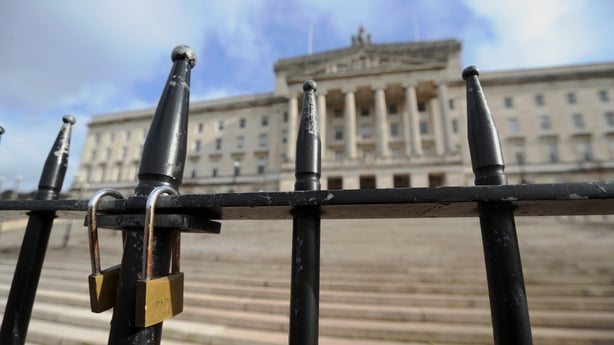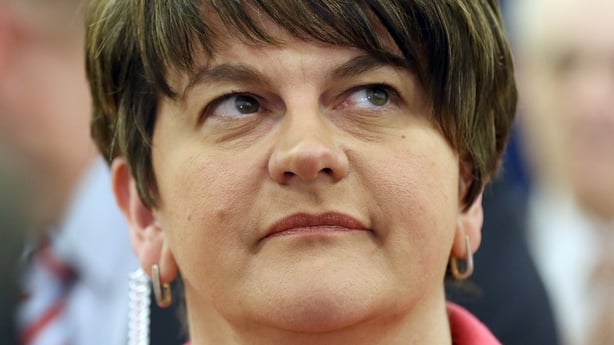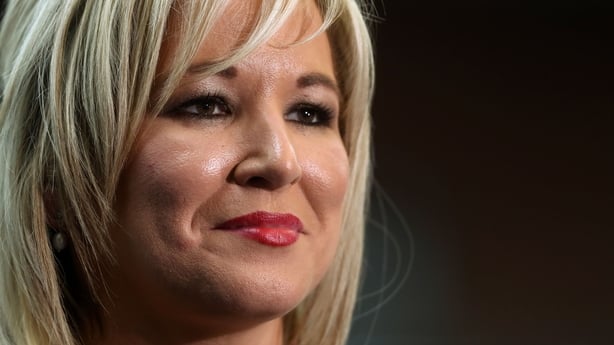Northern Ireland Secretary of State James Brokenshire has told the House of Commons there remains willingness to resolve the political crisis in the North.
He said that in past 24 hours he has spoken to leaders of five main Northern Ireland parties and to the Irish Government.
He said the window of opportunity is short, and the intensity of discussions must be stepped up.
Mr Brokenshire told MPs the British government does not want to see a return to direct rule from London but he warned that should talks not succeed, the UK government "will have to consider all options".
His statement comes after the region's main parties failed to form a new coalition executive before yesterday's statutory deadline.
Minister for Foreign Affairs Charlie Flanagan said the context of Brexit made it all the more imperative that a new executive was formed as soon as possible.
British Prime Minister Theresa May will not visit Northern Ireland before the triggering of Article 50 tomorrow - beginning the formal process for the UK to leave the EU.
UK government to consider re-introducing direct rule to NI should talks not succeed pic.twitter.com/zcWVNgKRn8
— RTÉ News (@rtenews) March 28, 2017
UK government could reintroduce direct rule
Mr Brokenshire has already warned local political leaders they will only be afforded a "short few weeks" to resolve their differences.
The Democratic Unionist/Sinn Féin administration collapsed in January amid a bitter row over a botched green energy scheme.
The subsequent snap election campaign laid bare a range of other contentious issues dividing the parties.
Under current legislation, the government is required to call another snap election if a deadline for forming an executive passes.

However, there is some room for manoeuvre, as there is no obligation to set a poll date immediately, rather within a "reasonable period".
The government could theoretically go for the nuclear option of reintroducing direct rule, but that move, which would require emergency legislation at Westminster, looks unlikely at this stage at least.
After yesterday's 4pm deadline passed without the required nomination of a first and deputy first minister, Mr Brokenshire indicated he would create some more breathing space.
Without a ruling executive or agreed budget for the upcoming financial year, control of Stormont's finances will be handed to a senior civil servant tomorrow, albeit subject to tight spending constraints.
Mr Brokenshire yesterday said that situation was "not sustainable", making clear the final window for negotiations would not be allowed to drift.
"I think there are a short few weeks in order to resolve matters," he said.
"The reason I say that is because of the stark issue in relation to public services here in Northern Ireland and the lack of a budget having been set, and therefore it is the impact on public services on having an extended period that is very much at the forefront of my mind in terms of the responsibilities that we have as the UK Government to provide that assurance to the public here."
Sinn Féin and the Democratic Unionists have blamed each other for the breakdown of the talks on Sunday night.
DUP leader Arlene Foster claimed Sinn Féin's "inflexible" approach to negotiations was to blame.

She said she did not believe another election would solve anything.
Sinn Féin leader in Northern Ireland Michelle O'Neill claimed the DUP had failed to live up to previous agreements and was standing in the way of progressive policies.
"We are standing firm - previous agreements need to be implemented," she said.

"We came at the negotiations with the right attitude, wanting to make the institutions work, wanting to deliver for all citizens."
Talks collapsed after Sinn Féin announced it would not be nominating a deputy first minister in the Assembly before the deadline. Without both first and deputy first ministers, it is impossible to form an executive.

